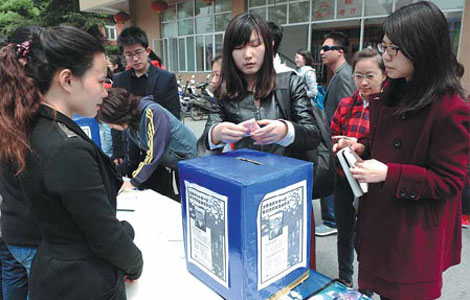Concern over students' mental health
Updated: 2013-05-06 08:08
By He Na and Yang Wanli in Beijing and Wang Hongyi in Shanghai (China Daily)
|
|||||||||||
Survival tactics
"In terms of treating problems in social relations, I don't think there are many differences between China and Western countries," said Cynthia Feng, 26, who spent six years studying in the United Kingdom and United States.
"I have heard that many cases of campus violence were caused by psychological problems. For example, a professor refused to allocate good projects to students who disagreed with them, or, sometimes, the professors and students were fighting over the same lover.
"In some cases overseas, campus violence consists of a lone gunman who injures a number of people; few cases of one-on-one revenge have occurred. However, in China, fatalities are often triggered by trivial matters and occur between two people or a small number," said Professor Lin.
"It may be that the problem lies in cultural differences. Westerners are likely to be more upfront about a grievance, while the Chinese usually attempt to avoid confrontation at all costs," said Lin.
She argued that prevention is preferable to cure and suggested a long-term program of student counseling.
Yang Yiyin, a social psychology researcher at the Chinese Academy of Social Sciences, said that when people are in constant close contact, reliance on and comparisons with each other can become magnified. "In relationships such as this, if expectations are unfulfilled, anger or depression may mutate into a desire for revenge or even attacks."
Feng emphasized that campuses in the UK and the US attach great importance to education designed to help students cope with and manage dangerous situations. She joined an emergency drill where the scenario revolved around a shooting incident at a US campus and said all students were encouraged to take part. She also once played the role of the gunman. "It was very impressive when tens of tennis balls were thrown at my face by the student 'victims' when I broke into the classroom," she said, referring to one of the survival tactics promoted by the police.
But the most important thing the students learned was that they must be vigilant in the face of unexpected attacks, because a large number of cases have been triggered by impulsive anger. "It (the training) helps people to remain calm. That means the chances of survival are higher," she added.
Yao Ping, who has lectured at Peking University's department of psychology for nine years, said US students, both at high schools and on campus, have access to optional group discussions about dealing with social relationships and emotional management.
"This not only helps students to express their hidden thoughts, but also creates the opportunity to better understand each other," she said.
Related Stories
Medical student in fatal poisoning to be arrested 2013-04-19 20:27
Poisoned student's family needs help 2013-04-18 18:16
Shanghai postgrad dies after alleged poisoning 2013-04-17 19:36
Medical student dies after suspected poisoning 2013-04-17 01:35
Medical student dies after being poisoned 2013-04-16 10:31
Today's Top News
Xi pins hope on youth for innovation, advancement
China playing bigger role in Middle East
FM wraps up tour on
note of stability
Museum window vandalized
Seawater can save thirsty country
New markets buy big at trade fair
Taking Midi to the max
Buyers lured by local goods
Hot Topics
Lunar probe , China growth forecasts, Emission rules get tougher, China seen through 'colored lens', International board,
Editor's Picks

|

|

|

|

|

|





